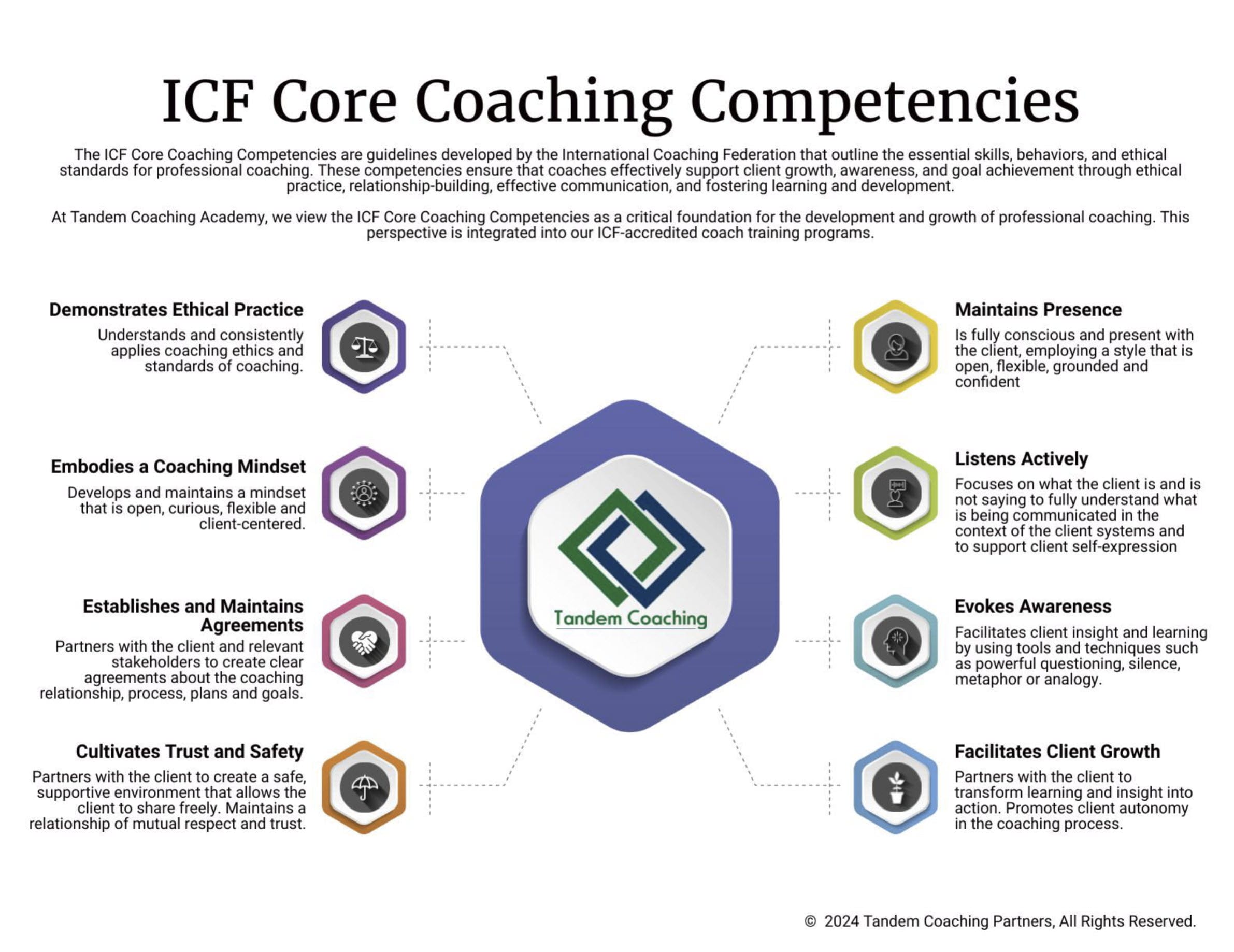Are you considering taking your coaching career to the next level with an ICF PCC certification? This blog post will break down everything you need to know about the requirements, from education and experience to mentor coaching, performance evaluations, and exam completion. Let’s dive in!
TL;DR – ICF PCC Requirements
In a nutshell, there are five requirements you have to meet to earn your PCC Credential. They are:
- Coach Education
- Extensive Coaching Experience
- Mentor Coaching
- Performance Evaluation
- Exam
We will go into each of these in detail in the below article.
Are you ready to start your PCC Certification Journey? We can help you earn your PCC credential without any unnecessary hassle. Join our program now.
What is an ICF PCC Certification?
The Professional Certified Coach (PCC) credential from the International Coaching Federation (ICF) represents a high standard in the coaching profession. It signifies that a coach has demonstrated advanced knowledge, skills, and commitment to ethical practice.
According to the ICF Global Consumer Awareness Study, 85% of coaching clients consider it important or very important for their coach to be certified or credentialed. So, earning a PCC certification is an investment that pays off. It also showcases your expertise and dedication to the coaching field.
Benefits of ICF PCC Certification
Becoming an ICF PCC-credentialed coach has many advantages, they include:
Enhanced Credibility
A PCC credential boosts your professional credibility, setting you apart from non-certified coaches. It signals to potential clients and employers that you have met the high standards set by the ICF and are committed to excellence in coaching.
Improved Skills
The certification process is thorough, ensuring you develop and refine your coaching abilities. You’ll engage in extensive training and practical experience, which will help you become a more effective coach.
Higher Client Trust
Clients are more likely to trust and engage with a certified coach. The ICF PCC credential assures clients you have the necessary skills, experience, and ethical grounding to help them achieve their goals.
Professional Growth
The certification process encourages continuous learning and development. You’ll need to stay updated with the latest coaching practices and methodologies, which fosters ongoing professional growth.
Networking Opportunities
Joining the ranks of ICF PCC-certified coaches connects you to a global community of professional coaches. This network offers valuable opportunities for collaboration, learning, and support from peers worldwide.
Who Needs a Coaching Certification?
If you’re a professional coach looking to validate your skills, increase your marketability, and commit to high ethical standards, an ICF PCC certification is for you. This certification is particularly beneficial for those aiming to work with organizations, executives, and high-profile clients who value accreditation.
Having a PCC credential can set you apart in a competitive market, demonstrating your commitment to ongoing professional development and adherence to a globally recognized standard of excellence in coaching. Additionally, it can open doors to more advanced coaching opportunities, enhance your credibility, and foster greater client trust and satisfaction.
List of ICF PCC Certification Requirements
Here is a little more information on each of the five main requirements you have to meet to earn your PCC Credential:
Education
To qualify for the ICF PCC certification, you must complete at least 125 hours of coach-specific training that aligns with ICF standards. This training must encompass a comprehensive range of coaching competencies, including ethical practices, effective communication techniques, and strategies for fostering client growth.
The curriculum should be delivered by accredited institutions or trainers recognized by the ICF, ensuring that the education you receive meets the high standards set by the organization.
Experience
Experience is a critical component of the PCC certification. You must accumulate a minimum of 500 hours of coaching experience, of which at least 450 hours must be paid for coaching engagements. This helps establish the credibility and professionalism of your practice.
Additionally, you must prove that you have worked with at least 25 clients, demonstrating your ability to apply coaching principles in diverse scenarios. This experience showcases your dedication to the coaching profession and your capacity to deliver impactful coaching sessions.
Mentor Coaching
You need to complete 10 hours of mentor coaching over a minimum of three months with an ICF-credentialed coach. The coach must provide constructive feedback on your coaching techniques and help you refine your skills.
Mentor coaching sessions typically involve reviewing your coaching practices, discussing challenges, and identifying areas for improvement. This process is designed to enhance your coaching proficiency and ensure that you are well-prepared to meet the standards expected of a PCC credential holder.
Performance Evaluation
The performance evaluation is a thorough assessment of your coaching abilities. You are required to submit two audio recordings of actual coaching sessions, along with written transcripts. These recordings are evaluated against the ICF Core Competencies, which include setting the foundation, co-creating the relationship, communicating effectively, and facilitating learning and results.
The evaluation process helps determine your ability to conduct coaching sessions that meet ICF’s professional standards and deliver significant value to your clients.
Exam Completion
Finally, you must pass the ICF Credentialing Exam. This exam tests your understanding of ICF’s Core Competencies and Code of Ethics. It includes a series of questions designed to evaluate your knowledge and application of coaching principles in real-world scenarios.
The exam ensures you have the theoretical knowledge and practical skills required to effectively and ethically coach.
Tandem Coaching offers a comprehensive program that helps you to achieve this credential through our experience and guidance. Start your PCC Certification journey now.
How to Earn an ICF PCC Credential
To earn your ICF PCC Credential, you must meet all the requirements in the section above. In brief, you have to take the following five steps:
- Complete Training: attend at least 125 hours of an ICF-accredited coach training program to fulfill the educational requirements.
- Gain Experience: Log your coaching hours. Make sure to meet the minimum required 450 paid hours out of 500 total hours.
- Find a Mentor Coach: Connect with an ICF-credentialed mentor coach for the necessary mentor coaching hours. You need a minimum of ten of them conducted over a three-month period, three of which must be one-on-one.
- Prepare Your Submissions: Record two coaching sessions, transcribe them, and prepare for the performance evaluation.
- Apply and Take the Exam: Submit your application to ICF, pay the fees, and schedule your exam.
Ready to start your PCC Certification journey? Apply now to start the training with us.
Frequently Asked Questions (FAQs)
Below is a list of questions we typically get about the ICF PCC requirements:
Which ICF Coaching Certification is Best?
The best ICF coaching certification for you depends on your career goals and your level of experience. The ACC (Associate Certified Coach) is great for new coaches, PCC (Professional Certified Coach) is ideal for experienced coaches, and MCC (Master Certified Coach) is for those with at least five years of coaching experience.
What Does it Mean to be an ICF Certified Coach?
Being an ICF-certified coach signifies that you have met high standards of education, experience, and ethical practice. This credential demonstrates your commitment to professional excellence and adherence to ICF’s core competencies and code of ethics.
The benefits of being ICF credentialed are numerous. First, it enhances your credibility as ICF certification is recognized worldwide, boosting your professional reputation. It also reassures clients of your expertise and ethical standards, signaling that you are trustworthy.
Additionally, ICF certification provides access to ongoing learning opportunities and resources, supporting your professional development. It increases your marketability, making you more appealing to potential clients and employers. Finally, it allows you to join a global community of professional coaches, expanding your network and opportunities for collaboration.
How Long Does it Take to Get ICF Certification?
The time to get ICF certification varies. For PCC, it typically takes several months to a few years, depending on your prior coaching experience, training, and the time needed to meet all requirements – most of all the coaching experience requirement.
At Tandem Coaching we are here to demystify the certification process and make it more accessible for you.
For example, if you coach an average of 10 hours a week, reaching 500 hours would take you a year. You also need to keep in mind that you have to prove that you have worked with at least 25 different clients. So it might take even longer.
Conclusion
Earning an ICF PCC certification is a rewarding journey that enhances your credibility, skills, and professional growth. By meeting the education, experience, mentor coaching, performance evaluation, and exam requirements, you demonstrate your commitment to excellence in coaching.
Start your path to PCC certification today and join the ranks of highly respected professional coaches worldwide.

Unlock Your Coaching Potential with Tandem!
Dive into the essence of effective coaching with our exclusive brochure, meticulously crafted to help you master the ICF Core Coaching Competencies.
"*" indicates required fields
About the Author
Cherie Silas, MCC
She has over 20 years of experience as a corporate leader and uses that background to partner with business executives and their leadership teams to identify and solve their most challenging people, process, and business problems in measurable ways.















